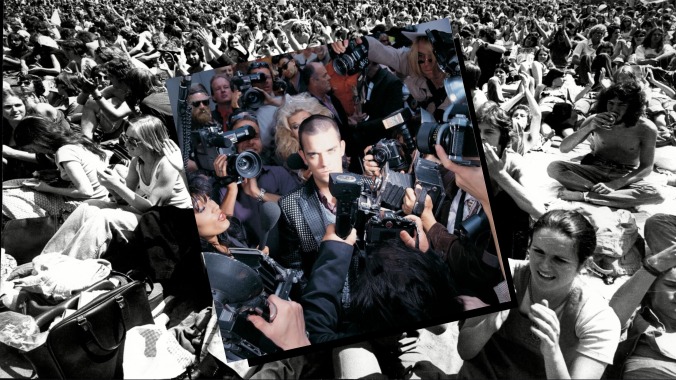Time Capsule: Robbie Williams, Life thru a Lens
While derided by the English press since his time in the boy band Take That, Robbie Williams proves his worth as a solo artist on his imperfect but undeniably fun debut album.

If you are remotely online, you’ve likely seen the memes already: Nobody in the United States knows who British pop star Robbie Williams is, and no one cares—even if his biopic Better Man is getting great reviews. And yet, here I am, asking you to give a shit as I revisit his debut solo album Life thru a Lens (the cover of which inspired the Better Man poster).
Williams was the youngest member of the English boy band Take That, joining in 1990 at the tender age of 16. No one expected him to be the one with the best solo career; he had all the personality and charisma, but group leader Gary Barlow was the voice. As Take That grew more successful, Williams battled substance abuse and creatively butted heads with Barlow; he was eventually asked to leave the band in 1995, since he was missing rehearsals and behaving recklessly. Over the next two years, Williams wrote and recorded the songs that would become Life thru a Lens—many of them with Guy Chambers, a musician whose publisher put him in touch with the hopeful solo artist. The Williams-Chambers partnership was a fruitful one, spawning five albums and numerous hits.
I’ll be the first to admit—I am not approaching Williams’ music with an ounce of nostalgia. I didn’t know he existed before 2013, when I moved to Ireland and used his 2012 song “Candy” on a sweets-themed radio show I hosted. And as someone with no rose-colored glasses on, I have to say: His music slaps. Life thru a Lens is not pop perfection by any means; it doesn’t reinvent the wheel and contains forgettably frothy songs alongside the bangers, as well as some truly cringeworthy lyrics. But when Williams is at the top of his game, it’s clear that he’s a born entertainer.
Opener “Lazy Days” has the bones of a Britpop hit; this could be the poppiest song on a rock record, though in reality it’s the reverse. Sugary, stadium-ready guitar and plenty of hi-hat back Williams here. His attitude-heavy, slightly nasal vocal performance almost veers into pop punk territory at times. There’s something incredibly funny (and very British) about the central refrain: “And we will have / A jolly good time.” The title track follows in much the same sonic vein, delving into class stratification in the UK in the context of Williams’ relationship with socialite Jacqueline Hamilton-Smith. “Just because I ain’t double barreled / Don’t mean I haven’t traveled well,” he sings (double barreled last names—that is, hyphenated last names—are associated with the upper classes in the UK).
“Ego a Go Go” shows off a less pleasant side of Williams: his need to shove his success in the faces of people who he feels have wronged him. In this case, it’s Gary Barlow, the former lead singer of Take That. Williams’ solo career ended up eclipsing Barlow’s, but that was never a given—as mentioned earlier, the public generally expected Barlow to be the one to “make it” outside the group. When Life thru a Lens came out, it bucked expectations, eventually reaching number one on the UK charts. As such, looking back on this song now, “Ego a Go Go” feels unsavory and boastful, even if the smooth grooves feel like a precursor to the jazzy ease of the Ocean’s Eleven soundtrack. “Did I break your heart when I stole your thunder?” Williams asks. And an earlier line is straight-up hilarious, begging the question of whether Williams knew what a golden shower was (or whether that slang was developed yet): “Hide away in your ivory tower / And cover me in your golden shower.” But asking an ex-boy band member who left school at 16 not to be immature feels like asking a porcupine not to be prickly.
-

-

-

-

-

-

-

-

-

-

-

-

-

-

-

-

-

-

-

-

-

-

-

-

-

-

-

-

-

-

-

-

-

-

-

-

-

-

-

-








































